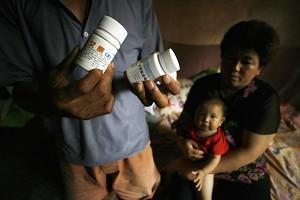HONG KONG — Meng Lin, who is HIV positive and an AIDS activist in Beijing, relies on friends to send him drugs from overseas every month—medicine he needs to stay alive.
There are days when he despairs as he watches his cache of drugs dwindle with no replenishment in sight.
“I feel very troubled when the supply drops to just eight to 10 days. The worst is when there’s just a day’s supply left, before the replenishment arrives,” Meng told Reuters in a telephone call from Beijing.
“It often happens and I get very anxious because if (I develop resistance to these drugs), there'll be no more chance for me.”
Experts at the 16th international AIDS conference in Toronto this week are discussing the difficulties of making AIDS drugs widely available to everyone around the world who needs them.
Some 650,000 people in China are living with HIV/AIDS, but only one in four who need HIV drugs received them in 2005, according to a recent report by the United Nations’ UNAIDS.
And if patients fail to keep taking the medicine, they may develop resistance to the few drugs that are available and require new and more powerful medications.
So-called second-line AIDS drugs are seven to 28 times more expensive than those given as the first course of treatment. More importantly, key second-line drugs, such as tenofovir and lopinavir/ritonavir, known under the brand name Kaletra, are not sold in China even though they are available in many other countries.
Meng, who takes second-line Kaletra and lamivudine, counts himself as very lucky because he has been able to procure them from abroad—at a cost of 160,000 yuan (US$19,500) a year.
“Lots of people need them in China, but they are not sold. For six months in 2003, I used drugs that were available in China, but I quickly suffered side effects, so I started on Kaletra in 2004,” said Meng, who learned of his infection in 1995.
“My friends source the drugs for me, from Uganda, and other countries, all over the place. Every month they are searching for me. I get my stocks monthly. I don’t have any stockpile, though a friend sent me stocks for two months recently.”
Waiting to Die
“Therapy in China is not mature. People take whatever drug is available, so I am lucky,” said Meng. “Most people don’t have the money to buy drugs (from overseas). Some get to join clinical tests, and they are considered very lucky.”
Meng belongs to the Ark of Love help group and travels throughout China to educate people about the disease.
“Some people are in need of second-line drugs but can’t get them, so they are waiting to die. In Beijing, there are at least 11 or 12 people that I know,” Meng said.
Suerie Moon, a senior adviser with Medecins Sans Frontieres (Doctors Without Borders) in Beijing, said the lack of drugs in China means patients cannot have the best that science can offer.
People who react badly to the few drugs that are available find they have nothing else to choose from.
For example, some users of Indinavir, a second-line drug, are known to have developed kidney stones. Meng felt numbness on one side of his body after taking Indinavir for six years.
“It’s a fundamental problem that we don’t have the drugs that we need,” Moon said. “We shouldn’t be in a situation that we have to make do with suboptimal medicines. We should have the best drugs that we can get. We should have the most powerful ones, the ones that are the safest, that have the least side effects.”
Abbott Laboratories Inc. produces Kaletra, the biggest-selling of a class of HIV drugs known as protease inhibitors. Beijing is negotiating with Abbott over a price to supply the drug, but a deal is not expected any time soon.
Sources told Reuters that Abbott is asking US$1,000 for a full-year course but the Chinese regime is unwilling to pay more than US$400.
Asked for comment, an Abbott spokeswoman said it was in discussions with China’s health ministry regarding the availability of Kaletra but would give no other details.
Activists are critical of the company.
“In my opinion they are abusing their monopoly,” said Moon. “They are abusing the patent rights they have by refusing to supply a life-saving medicine to a population that needs it.”
Edited by The Epoch Times.





